latest
To be Anti-Refugee is Un-British
I
Compassion for asylum seekers is a traditional British value – a real British value, not a Quango-invented value like ‘tolerance’ that wouldn’t be out of place in any Western European country.
Britain’s reputation as a friendly haven for the oppressed is wholly based in historical fact – and I don’t mean “we found the skeleton of a 15th century black man in Cornwall, and that’s why unfettered channel boat crossings are a good thing”.
Now to be clear: a refugee is not a migrant. Most channel crossers are economic migrants looking for wealth, which I am not here to defend nor discourage. When this article says “refugee”, I am referring to those fleeing war or persecution, such as Ukrainian civilians, Iranian political opposition, or Uyghur Muslims from China. And while I do not advocate handing out visas to all 21 million stateless refugees in the world today, it is my opinion that we should take in many more than we currently do – regardless of any policy towards other forms of migration – and make the United Kingdom the best and most welcoming place in the world to be a refugee. Not just for altruistic reasons either – we can greatly benefit from this arrangement.
From 1828 to 1905, at the height of her imperial power, the number of immigration restrictions the British Isles had was zero. The borders were completely flung open, allowing anyone who was downtrodden, oppressed, or impoverished the chance to live a life of freedom and security behind the protection of the Royal Navy.
This was a point of pride to the Victorians – the Times newspaper wrote in 1858;
“Every civilised people on the face of the earth must be fully aware that this country is the asylum of nations. We are a nation of refugees. There is nothing on which we are prouder and more resolute.
All Europe knows and respects the asylum of these isles.”
The first wave of refugees from the continent – since the Huguenots – were the French clergy and nobility fleeing the Reign of Terror. Around 4,000 arrived in 1792, settling mostly in Soho and other affluent areas of London. They were forced to undertake manual labour for the first time in their lives, working as tailors or publishers. Due to a lack of Catholic churches in London at the time, Anglican churches such as Saint Pancras welcomed their brothers in Christ and offered church facilities for Catholic masses and burials. No fewer than eight former French bishops are interred at the church.
The Duchess of Gontaut wrote of her arrival to England;
“Arriving at Harwich…made my heart beat faster in the hope of a better future. It was a happy premonition because from that moment we experienced the good and loyal hospitality of the English.”
Successful integration of refugees is surprisingly easy – give them the chance to work, and access to resources. Economic deprivation is the number one predictor for whether or not an ethnically diverse neighbourhood is socially coherent, but current policies make this nearly impossible; Refugees in Britain must wait 12 months after arrival before they have the right to employment.
Labour is the world’s most valuable commodity—yet for 12 months, a refugee is forced to relax in a four-star hotel and eat free chef-prepared meals, all paid for by taxpayers. The faster a refugee can obtain a job, the faster they can be turfed out of hotels and become productive members of society.
II
The Victorians were so committed to the policy of free asylum that they were even willing to create diplomatic scuffles to uphold it.
In the mid-century came the socialists. Marx, Engels, Kropotkin and co. all escaped harassment from tyrannical European governments by making the free and prosperous shores of Britain as their home.
In 1858, a collection of these continental anarchists based in a London lodging house plotted a failed assassination of Napoleon III. One man who stood trial for this conspiracy was French exile Simon François Bernard. The French government demanded he be punished – but the British press were steadfast in their opposition to a conviction. Partly because it would undermine the policy of open borders (some things never change), but also because anything that frustrated our eternal rivals was surely a good thing.
While I don’t suggest we invite any Islamic terrorist groups to set up an embassy in Fitzrovia, we can learn from this example to forge our modern-day policy on political refugees.
I and many readers of The Mallard yearn for a restoration of Britain’s prestige on the world stage, a way for our now Empireless nation to regain that global reach. So what could be more of a leverage over our enemies than aiding those who are consistently a thorn in their side?
Several Hong Kong dissidents such as Nathan Law have already fled here and continue to campaign for a free Hong Kong from the safety of the UK. We could extend this to other Chinese, Iranian, or Russian political dissidents, and be the first port of call for Governments-In-Exile. Provided that they do not actively harm British or Western interests, we can only gain geopolitically by being the prime destination for exiled activists the world over.
III
The open borders policy came to an end at the start of the 20th century. The last wave of refugees were impoverished Poles and Jews escaping persecution from the Russian Empire. One such refugee named Israel Lipski was hanged in 1887 for the murder of a woman in Whitechapel, and the story gave rise to the notion of “pauper aliens” committing crimes, stealing jobs, and pushing up rents.
The Conservative government of the day proposed the first restrictions on immigration in 1902. But they weren’t completely without opposition – it was none other than Winston Churchill who said these new rules were;
“a loathsome system of police interference and arbitrary power that would harass the simple immigrant, the political refugee, the helpless and the poor…This country has so greatly gained from the old, tolerant, and generous practice of free entry and asylum. This law is expected to appeal to insular prejudice against foreigners and racial prejudice against Jews.”
And Churchill was right. Even today (despite eye-catching headlines) the effect refugees have on the crime rate is low. During the 2015 European migrant crisis, Germany took in over 1.4 million refugees – yet by 2019, their crime levels had fallen to the lowest in thirty years.
And if a refugee does commit a crime, surely the only person who should be punished is the guilty refugee – not the thousands of other innocent, law-abiding evacuees with whom they arrived alongside.
Nonetheless, the Aliens Act introduced the first restrictions in 1906; immigrants were required to prove they could support themselves financially, not be “liable to become a charge upon the public rates” (i.e. disabled), and have a clean criminal record.
IV
But this was not the end for Britain’s role as an international safe haven for the oppressed. During the Great War, almost 250,000 Belgian refugees were given shelter on these isles, all housed and fed for the duration of the war despite the hardships and food shortages suffered by the nation. The generosity displayed by the British is illustrated in the 1916 Fredo Franzoni painting “Landing of the Belgium Refugees”, showing dozens of boats carrying huddled masses landing in Kent. They are being welcomed by a large crowd led by the mayor of Folkestone. To the side, a nurse stands ready to tend to the sick, while two children bear welcoming gifts. A British ensign flies prominently from one of the ships.
Many of the Belgians were housed by individuals volunteering a spare room. Others were housed in purpose-built villages ran by the Belgian government-in-exile, where inhabitants used Belgian currency and spoke Flemish. Despite some local objections to these ethnic enclaves, within a year of the war being over, 90% of refugees had returned to Belgium. Their only lasting impact being a few memorial plaques, and Agatha Christie’s Hercule Poirot – who was based on a Belgian that Christie had housed during the war.
If we could do it in 1914 during total war, we can certainly do it today.
Granted, the cultural differences between a Brit and Belgian are smaller than a Brit and a Syrian, or an Iranian, or a Venezuelan. But those of you who are worried about the social and ethnic composition of Britain needn’t worry about refugees – like the Belgians, the average refugee spends less than ten years in exile before returning to their native country, and only the most protracted conflicts such as in Afghanistan or Vietnam produce refugees who stay longer than 20 years. Those who choose to stay permanently are clearly integrated Anglophiles who prefer British society over the land most of their compatriots have since returned to.
Overall, while you and I may disagree on general high or low skill migration into Britain, it’s quite clear that compassion for asylum seekers is a long-forgotten tradition that we should reclaim. We can learn from the 19th century to build an asylum system that is both economically and geopolitically a benefit to us – as well as, of course, being the moral thing to do.
Notes From the Bleak Midwinter (Magazine Excerpt)
The weather has been rather dreary in what little of this year has transpired, so it is almost logical that my first article of the year for this publication might be similarly pessimistic. I was invited specifically to write about my expectations for 2023, so I invite readers to prepare to be depressed over the next couple of pages.
In short, 2023 will probably be a continuation of 2022 in many ways. For example, the war between Ukraine and Russia will remain an orgy of bloodshed and hysterical moralising with no end in sight. Ergo, Western political actors will continue to exploit the war for global brownie points, weakening their militaries and frittering away their citizens’ taxes to keep the useful distraction to the burden of responsible governance the war has provided since last February. That said, the overwhelming worldwide focus on that war should stop some (but not all) flashpoints elsewhere from becoming all-out conflicts, notably in Taiwan, Kosovo and the Aegean Sea. Not all proxy sponsors are in the right places to give a space where armed conflict could occur, but it might end up a different story for the possibility of Turkish intervention into northern Syria and of Azerbaijan into Armenia.
Speaking of domestic politics, the picture is not much rosier. Yes, Rishi Sunak might fulfil his “promise” of falling inflation through simple laws of economics at the bottom of a cycle, but his inevitable attempt to take credit will undoubtedly ring hollow with the masses. One cannot read inflation like poll numbers, meaning the price rises are already embedded into economic reality alongside the below-inflation wage growth. Consequently, the strikes will rumble on for at least the first half of this year as the trade unions try to extract a victory from kicking a government when it is down. It has seemed to me that Mick Lynch and company want to re-enact the ‘Winter of Discontent’, but the reduced scale of unionised workers in proportion to the overall workforce will not make life as holistically dysfunctional from striking alone as it was during the mass strikes of the 1970s. I guess their ambitions, borne out by romanticised period role-playing, are at least typical of the present time. After all, similar fantasies which only the children of later Cold War politics are capable of conjuring drives the foreign policy situation I discussed earlier.
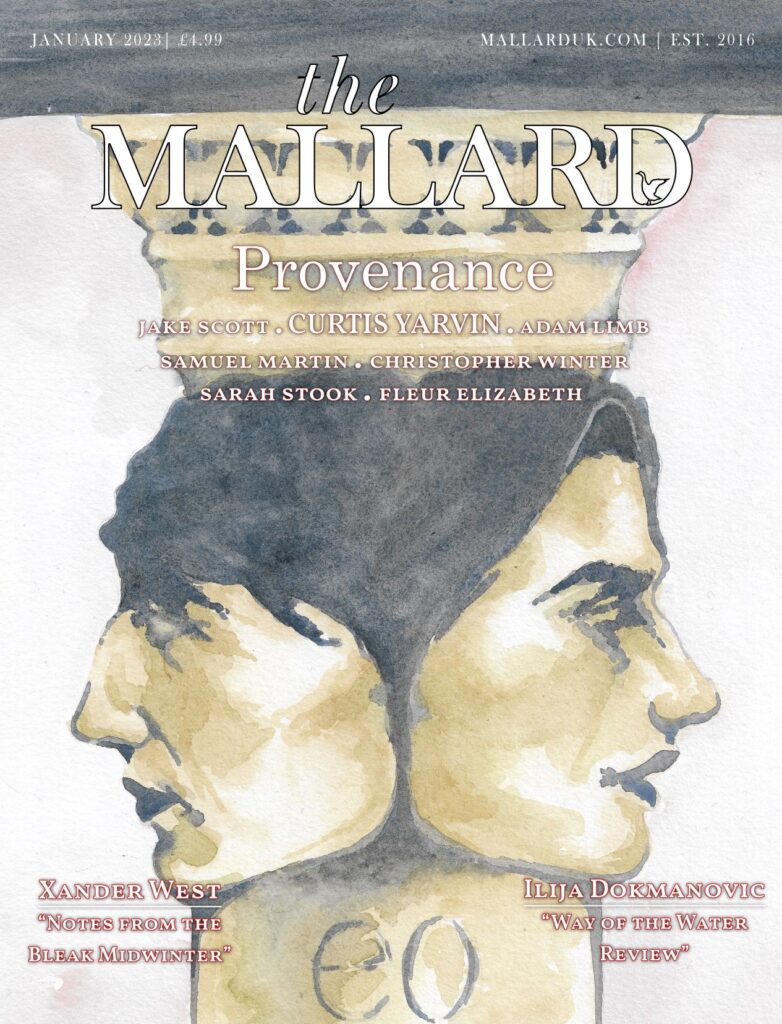
This is an excerpt from “Provenance”. To continue reading, visit The Mallard’s Shopify.
It’s Over/We’re Back or: How I Learned to Stop Worrying and Love the Rollercoaster (Magazine Excerpt)
In short, the year started badly but was peppered with good moments. By mid-2022 it was going excellently, and I thought I was finally past the worst of what this year could throw at me. My hubris was rewarded with some of the worst few months of my life so far. I know that, in the grand scheme of things, I should be thankful for all that I have, and I certainly recognise that I have it much better than most people. It helps to remember that, but it doesn’t change how I felt and acted at the time.
I suppose that that is the nature of life and hindsight. At the time, these moments seemed to mean everything. They either crush your soul and spirit or bring you to the highest heights. I think that this sentiment is expressed quite well in the ‘it’s over/we’re back’ memes that have propagated themselves across my twitter timeline for the past few years. We outright refuse to recognise our own mundane victories and losses, and instead focus on the peaks and troughs – this is natural of course, we would go completely insane otherwise.
I don’t think it is bad to allow these experiences to hit you. Part of the human experience is to be hit by these ups and downs. It is the dwelling on these events that becomes a problem. Holding on to fading hurt and fleeting success instead of moving on in some sort of twisted nostalgia for our best and worst moments can lead us down a very dark and dangerous road. It makes us forget who we are and who we can be. Our lessons learnt, we should embrace the change and simply move on. It is in these moments that we grow and mature as people, and become a better version of ourselves.
For me personally, this year has been an absolute rollercoaster of highs and lows, and that has been very hard to deal with. Things seem to be better now, however, and I am filled with enthusiasm for what the new year can bring me. I think that 2023 will be an amazing time for personal growth and development. I still have a lot of weight to lose, but I am steadfast in my determination to see it through this year. Coming to terms with my situation and state of mind will not be easy, but life is not supposed to be easy. Nothing worth doing is easy.
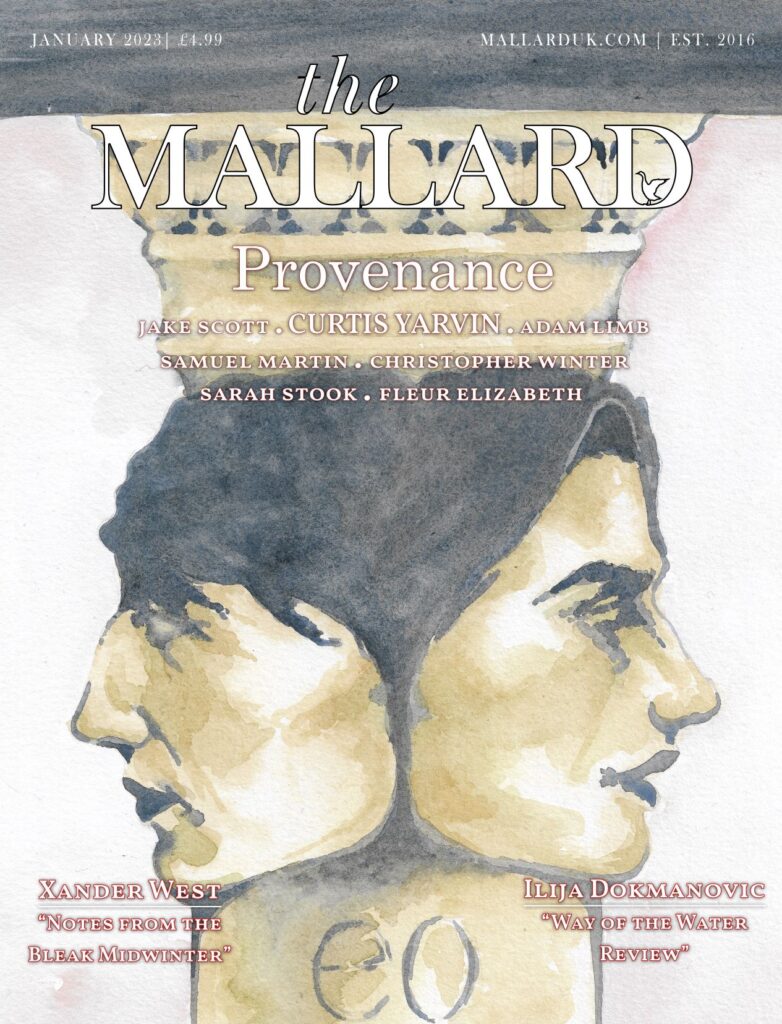
This is an excerpt from “Provenance”. To continue reading, visit The Mallard’s Shopify.
Predictions for 2023 (Magazine Excerpt)
The 2022 midterms should have been a bloodbath. It should have been a huge sweep for the Republicans, relegating the Democrats to the depths of minority rule. Instead, the Republicans managed to win the House only respectably, whilst the Dems kept the house. It’s widely believed that better candidates could have kept the house.
Good candidates do exist. Ron DeSantis managed to make gains in Florida. Glenn Youngkin flipped Virginia. Brian Kemp safely won re-election in Georgia. Unfortunately, there were also many poor candidates. A competent Republican could have beaten John Fetterman in Pennsylvania. Somebody else could have beaten Katie Hobbs.
The same is true for Presidential elections. The Republicans have only won one election in the 21st century outright, with both the Electoral College and popular vote – George W. Bush in 2004. 2000 and 2016 both saw Electoral College wins but popular vote losses. Whilst external events came into play, it’s not a great look.
That being said, it almost seems that the Republicans like losing. They’re not making any real attempt at winning. Whilst they might choose decent candidates, there’s a high chance they won’t.
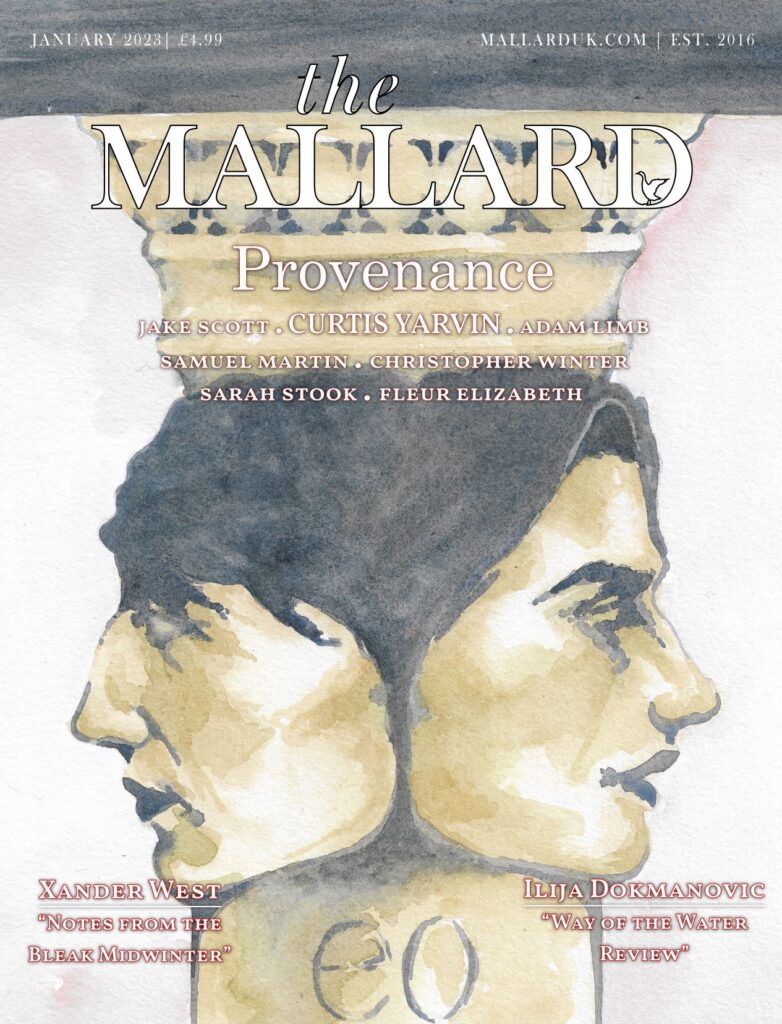
This is an excerpt from “Provenance”. To continue reading, visit The Mallard’s Shopify.
Avatar: The Way of Water Review (Magazine Excerpt)
It has been almost 12 years since the release of one of the highest grossing films of all time – that being 2009’s Avatar, James Cameron’s sci-fi epic.
There has been a running meme for the last couple years that despite the first Avatar film’s wild success in the box office, it isn’t a memorable film. The characters aren’t memorable, the storyline is a copy and paste of 1990’s Dances With Wolves, and that its success hinged on the technological breakthroughs in CGI and 3D film that were a staple feature of the film.
In retrospect, the running joke isn’t far from the truth. Avatar is a film that hasn’t held up for casual viewers on its own merits, but rather through nostalgia of a time that has long passed – a time before the insanity of the last 10 years in the social and political scene, where most people were more concerned about the film’s core messages; that being a deeply environmentalist film, a critique on colonialism, and the insatiable appetite of human discovery wreaking havoc on innocent and more noble creatures.
While there are aspects of the original film I enjoy, such as the detailed world-building that Cameron is known for, and the cutting edge visual effects, it still failed to resonate with me the way it has with many other viewers.
The preaching was exhausting when I watched it the first time in 2009, and it is still exhausting today. I get it. Humans are bad, save the trees, the military industrial complex is so evil, etc, etc.While the second installment Avatar: The Way of Water certainly delves a little deeper into the lore and ups the stakes for the protagonists, it still carries the same bare-bones environmentalist sermon that has become all too exhausting in this day and age, especially when we have Extinction Rebellion and Just Stop Oil cronies ruining fine art and causing general inconvenience to all those around them in our current reality.
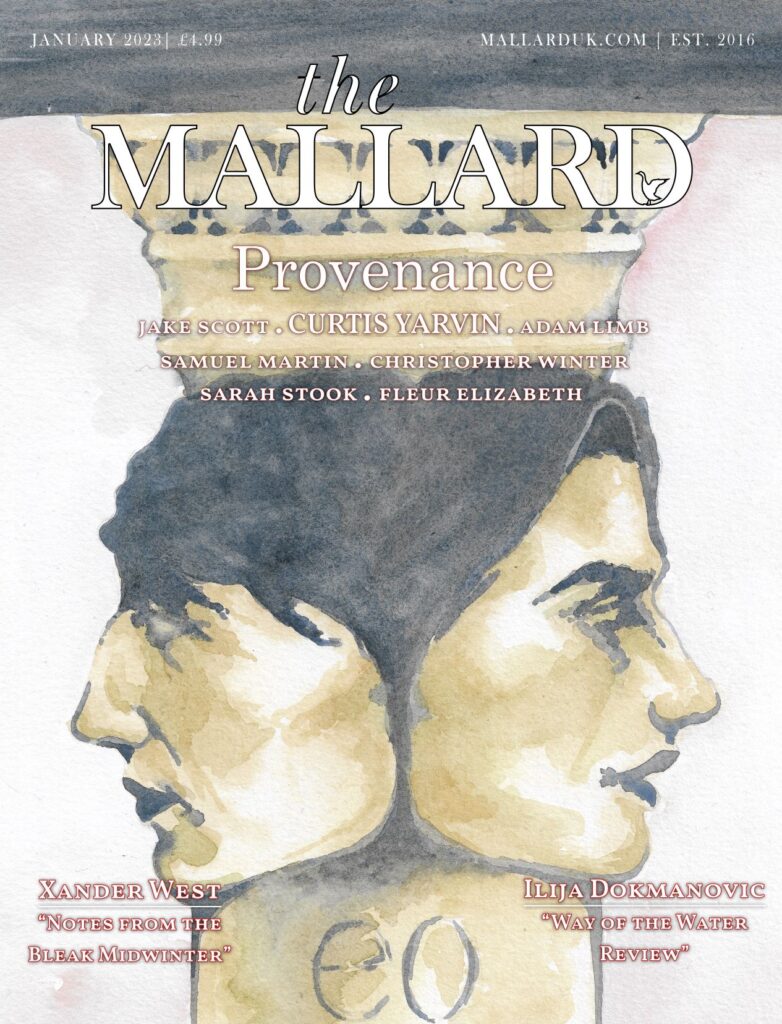
This is an excerpt from “Provenance”. To continue reading, visit The Mallard’s Shopify.





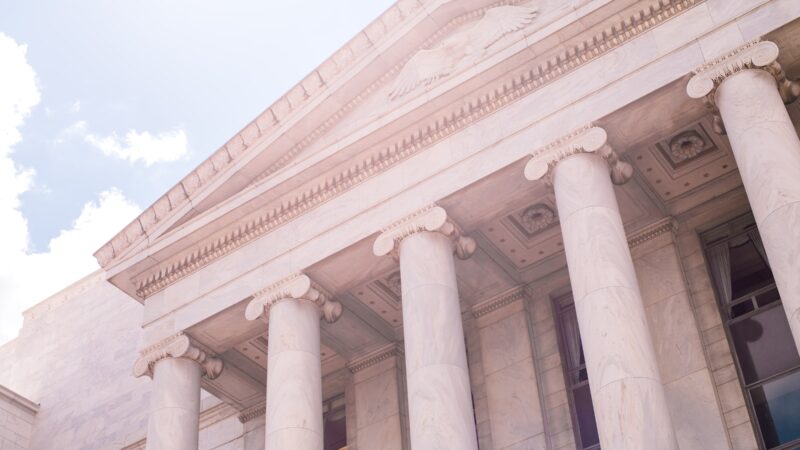

On The Foreign Aid Sector
Foreign aid is a somewhat controversial subject.Those in favour argue that as a developed nation, we are morally obligated to help those who need it. They argue that it will improve the lives of others and that it is a great use of soft power. Opponents argue that charity should begin at home, that we have our own problems to deal with and that it has done nothing.
Regardless of your view on the matter, you cannot deny one thing- that the foreign aid sector is in need of dire reform. It’s not the sector that its advocates promise us that it is. It’s a sector rife with sexual violence, corruption, the spreading of illness, mistreatment of children and misallocation of resources. A movement that should be helping others is doing the complete opposite.
Let’s Talk About Sex (Violence)
One problem with the aid sector is the sheer amount of sexual violence that occurs within it. A person only needs to browse articles about UNICEF and others to see the deluge of scandal.
Women are encouraged to sleep with aid workers in order to obtain jobs. Children and women are raped, used as prostitutes. There are illegitimate children and abortions. It is not just one or two workers or just a single organisation. Numerous men and organisations were named by a variety of women.
One Congolese women died after a botched, illegal abortion. The man who’d impregnated her ghosted her after she told him. Who’s going to tell her children?
Haiti was another victim of deviance.
It is a country that has suffered political instability, dictators, and natural disasters for years. Even before the tragic 2020 earthquake, aid rushed to Haiti, so did those who sought to violate the innocent. For years, peacekeepers raped and abused Haitian citizens. Children as young as seven were raped. One report found 265 children whose mothers were abandoned after falling pregnant. These women suffered as family and neighbors cast them out. Peacekeepers took advantage of the poverty by offering food and money to minors in exchange for sex.
Even if these things were done to a consenting adult, it is a gross abuse of power and sexual manipulation. Sri Lanka, the country where most of the offenders came from, eventually paid up. The UN also took its sweet time to apologise, eventually owning up in 2016.
Let us not forget the famous whistleblower Kathryn Bolkovac. The former American police officer discovered a huge sex trafficking ring in the war-torn Bosnia, with young children involved. Further digging from Bolkovac revealed that those involved were foreigners, with many aid workers included. These crimes were actively ignored or covered up by the powers that be. After attempting to blow the whistle, Bolkovac was demoted, then fired. She luckily eventually gained help and did reveal it to the world, but barely anything was done. Whilst Bolkovac would eventually win money for wrongful dismissal, the company would not do much else. Even years after Haiti, Congo and Bosnia, cases are frequently dug up today.
Money, Money, Money
In 1983, a devastating famine hit the African nation of Ethiopia. News cameras from around the world broadcast images of devastation and starvation to the homes of millions. Donations poured in from average citizens. ‘We Are the World’ and ‘Do They Know It’s Christmas?’ topped the charts. Live Aid gave us classic performances from the biggest acts of the age.
Most of it didn’t go to the starving Ethiopians. A large portion went to arming militants and the dictatorial government of the day.
We all hear jokes about how palaces are built with aid money and sadly, it’s not incorrect. Aid to Afghanistan went to the Dubai holiday homes of the elite. Rebels, politicians and tribal chiefs are stealing money destined for the starving population in Yemen. A sixth of foreign aid ends up in the bank accounts of the wealthy and the powerful.
Who can forget the Oil-for-Food scandal in Iraq?
Just look at how much the heads of charity organisations are on. Since taking on the role of CEO of the International Rescue Committee (IRC), David Miliband has seen his pay treble in eight years. A recent £20K pay rise has seen him with a new salary of £768K. That’s over $1M. This money, as one would expect, is helped by taxpayers’ money.
We can wax lyrical about the pay of CEOs in private charitable organisations, but it’s still pretty darn shady. When it’s coming from taxpayers, well, still not great. Over $1M could pay for malaria treatment or schooling for a child. Instead, it all goes to rich fat cats.
Ineffective Bureaucracy
Aid isn’t easy. You don’t just dole out cash to a hospital or a school. Aid creates bureaucracy. There are multiple layers, not least in the ground. You must pass through so many people- it may create jobs, but it also creates problems. Before it reaches those who need it, it’s gone.
In countries with mass amounts of corruption, money is siphoned off to numerous individuals. Politicians and those in charge often get kickbacks in order to get things moving. It changes hands far too often.
The world was horrified by Biafra in the 60s, Ethiopia in the 80s and Haiti in the 10s. Yet, years later, we still see adverts for starving children being forced to walk for miles for water. International aid has not found a way to break decades of issues. It is not necessarily their fault- wars and disasters are pretty hard to predict- but the point still stands.
Where are the schools? The water pumps? The hospitals?
Sometimes it’s not safe for aid workers. It just might not be feasible. They also need to pull their fingers out. How can they help when they’re based in cities? How can they help when the assistance of officials is based on bribery?
Take Indonesia for example. The country has attempted to put themselves in the forefront of the international aid community with a pledge for millions. That’s all well and good, but it’s a conversation that’s been going on for years. Bureaucracy has prevented management and funds being properly allocated.
As the government argues with itself on the merits, or lack thereof, of international aid, they need to look at reform first. We cannot support a sector that rapes children, can’t allocate resources and takes money from the mouths of the needy.
Photo Credit.